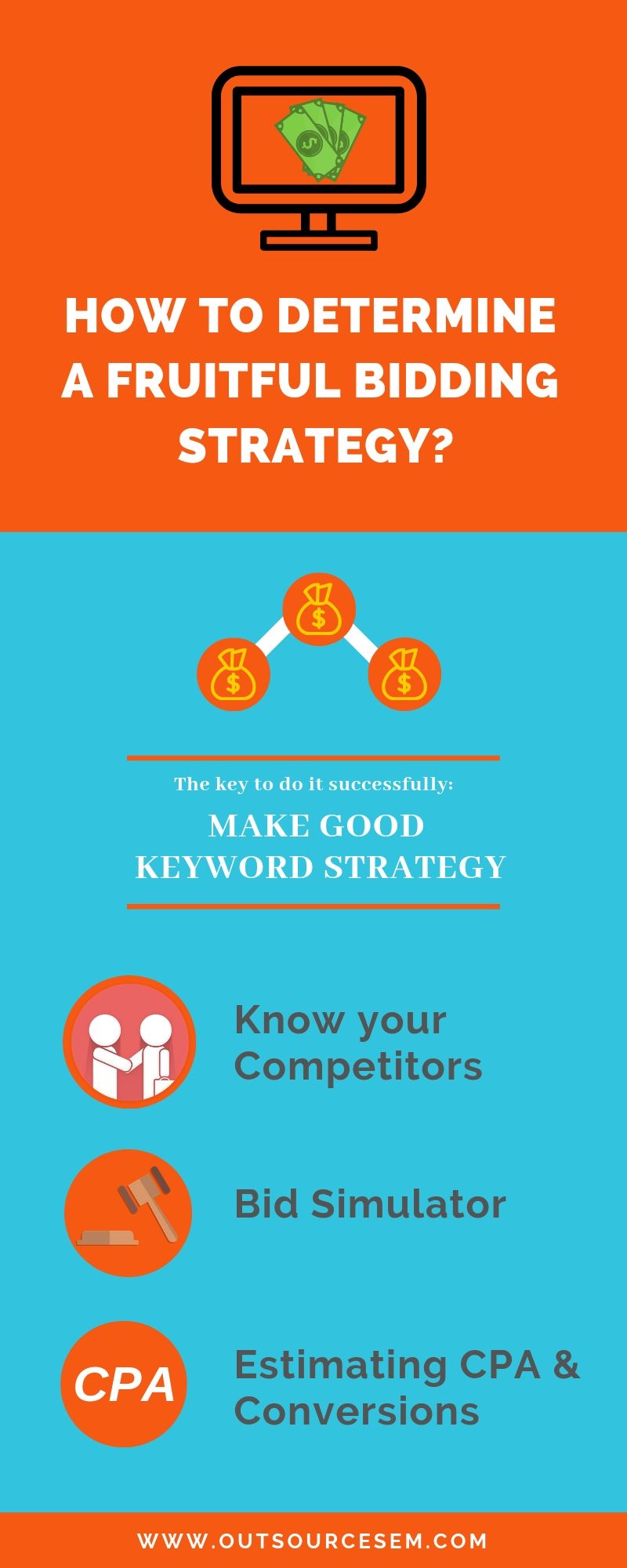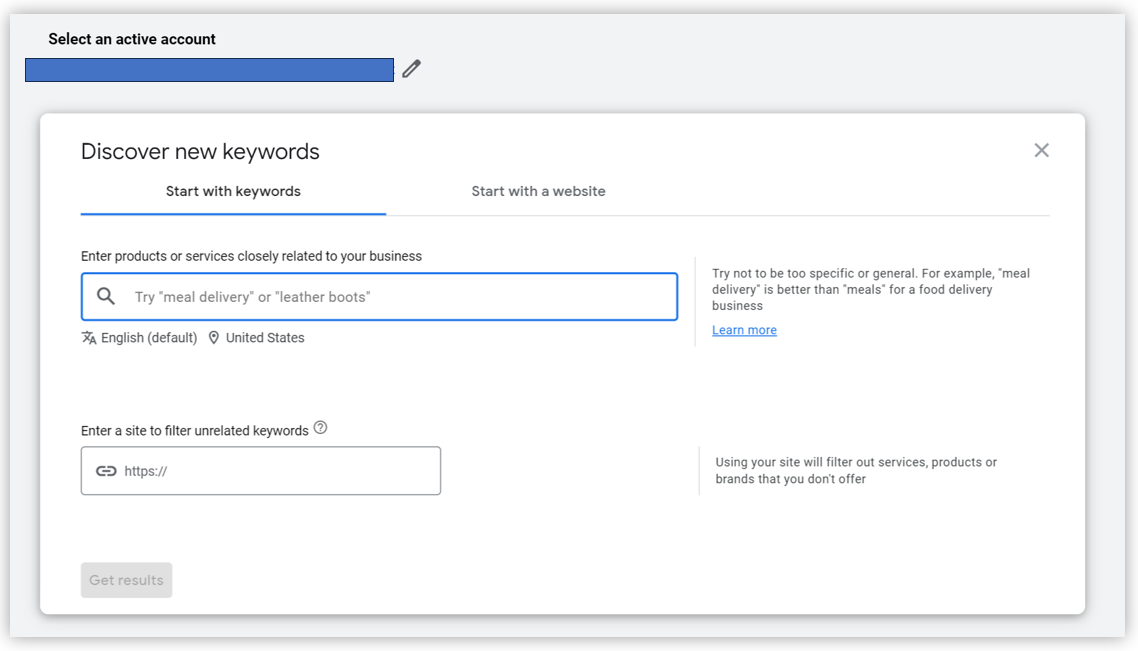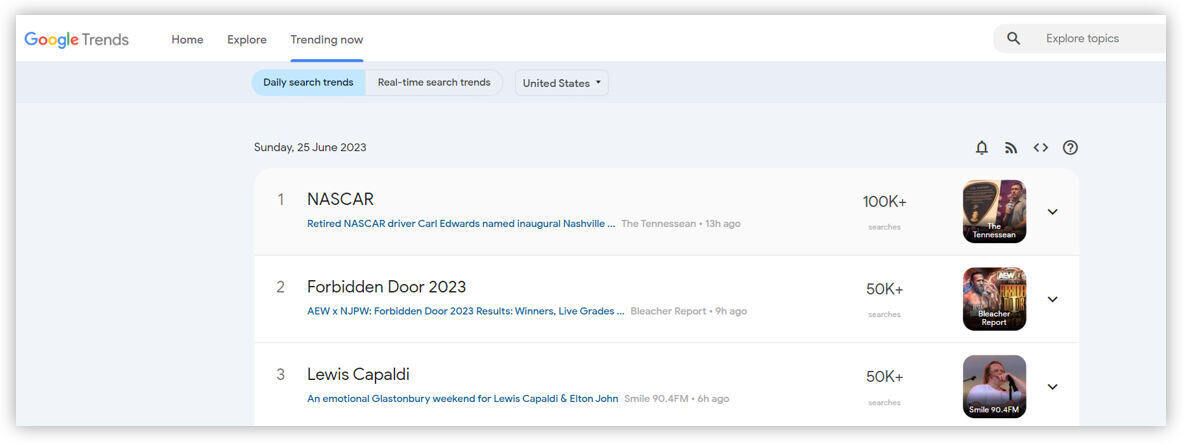Having a smarter keyword bidding strategy can outbreak your poor performing campaigns to more profitable level. Proper keyword research before implementing can become effective if you are working in-depth on bidding strategy. For making a good keyword list for your running campaigns or upcoming ones, competitive keyword research is necessary in achieving so.
How to determine a fruitful bidding strategy?
Google Ads (earlier known as Google AdWords) offers a wide variety of bidding strategies that can be designated to different PPC campaigns as per their requirements. First of all, you need to look at the network on which you want to show your ad. Secondly, what do you want more from the ad campaign? You can choose the respective bid amount for your campaign if it views, clicks, conversions, or impressions.
Now, let’s come to the point on 3 advanced strategies which we are going to discuss here.

1. Know your competitors:
If you know your competitors well then half of your work is already done. Because, it will let you to work comparatively better than those market competitors. Suppose, you are running your PPC campaign and doing it great to achieve tremendous results but your effort will be wasted if you don’t have any clue about your competitor’s functionality. They might beat you in this case as they understood the buyer's needs and product demands. So, you need to look upon your marketing fellows as well other than giving your full effort to make your campaign successful.
You need to look upon how they are ranking in SERPs, what their keywords strategies that searchers reach them easily. All these types of researches will bring more positive results and a winning situation for you. To do so, you can take help of ‘Google Auction Insight’ report which tells you from whom you are competing against for particular keywords. It will reveal you to the percentage of time your ad shown up for the particular keyword you bid upon and whose ad rank above yours.
2. Bid Simulator:
It’s a powerful tool by Google that allows you to check the weekly performance of any campaign. To do so, you need to enter different bid amounts to see the results. For your Ad group or keyword, the regular Bid Simulator will determine how a small variation in maximum CPC bid can bring a lot of changes in the number of clicks, conversions, impressions & conversions value. You can see this on Keyword & Ad group tabs. For an, e.g., let us assume that you have a max CPC bid of USD 1 for your particular keyword, but you are also interested in knowing the results at $0.5 and $2.The regular Bid Simulator can show you the max. CPC results at these chosen bid amounts, and you can compare the parameters like impressions, conversions, etc., to know which suits you most.
3. Estimating CPA & conversions:
We all are familiar with the keyword planner tool and often use to know about suggestive keywords but you can also use it for estimating CPA and Conversions. Instead of reviewing search volumes and CPC (cost per click), you can walk around Cost Per Acquisition and conversions based on previous stats and performance results.
It’s a useful way to cut down the time in finding new keywords which have higher search volumes and can be acquired easily.
To use it efficiently, log-in to Google AdWords > Tools > Keyword Planner > Get traffic forecast for a list of keywords. After that enter the particular keyword, and you will get the result.
What should be the keyword research strategy that needs to be follow-up?
Keyword research strategy is a necessary skill for e-marketers. Apart from knowing the good keyword list for their SEO and PPC campaigns, they should also understand the importance of keyword research for writing content. That is, what keyword or phrases need to be included while writing content. Also, it will help you to draw an idea of what’s your target audience are searching for and how will you rank for those keywords.
If you do not use those keywords which people are actively searching for or are interested in, then you might lose necessary traffics sources for your website. Sometimes, it becomes important to get right audiences for your campaigns instead of getting unnecessary traffics. Thus, with keyword research you can work along demand shift, retaliate with changing market condition and produce the products & content which will fulfil the needs of those targeted and newer audience.
Small steps to be taken while estimating keyword’s value are as follows:
• You should question yourself: While performing keyword research, you need to ask yourself several question like ‘Is keywords will be relevant for your product terms? Do customers will find products on your site using these keywords or it will give unnecessary results? Whether, it will fulfil your organizational goals?’, these are some question which needs to be asked yourself and once you feel satisfied then use those keyword terms.
• Always try to pre-search keyword or phrases on bigger search engine platforms: It will help you to draw a clear picture about competitors who are ranking on those keywords and how you will beat them with those keywords. We have discussed earlier that without having proper knowledge of your competitors and their Google keyword strategy, you can’t survive in the competition or your business may fall down at some point. So, never forget to search those keywords on search engines.
• You can try different keyword through sample campaigns at Google Ads: If your keywords are not performing anymore, then nevertheless buy test traffic to see the result. Go to exact match option in Google Ads and get the traffic for relevant pages on your website. Monitor the conversions and impressions value for at least 150-200 clicks to get the precise results.
• Long tail keywords: Keywords phrase which contains at least 3 terms are known as long tail keyword. These are less competitive & more specific when comparing it with generic keywords. You will acquire somehow good results in both short as well as long term outcomes. Due to specific nature of long tail keyword, they will almost rank high for the popular search term while your ad will be still shown for the head term if your long tail keywords contains those head terms. Also, traffic rises due to these terms will be justified enough to convert into leads and conversions.
Graph for long tail keywords
We have discussed so far about 3 keyword strategies and steps to be followed to determine keywords. Now, let’s throw some light on important tools which will be helpful in planning and performing keyword research task. Few of them are:
• Keyword Planner tool: This tool is powered by Google, which is widely used among digital marketers. It’s a free tool that will help you to perform keyword research easily. If you have an ad campaign on Google Ads, then it’s a good place to start. But, you can still do keyword research here if you don’t have any ad campaign. You just need to create/sign-in on Google AdWords. When you enter any keyword in the search term, it shows a list of related and similar keywords with some info metrics to specify the competition among those keywords.

• Keyword Tool.io: It’s a free fundamental keyword research tool. Generally, it is useful for long tail keywords; if you are thinking of any long tail one and want to have a related one, it will be helpful. You do not need to create an account to use it in the basic version of this tool. Generating a relevant long tail keyword list takes the help of Google Autocomplete. The generated list will be based on a few factors, like how frequently users took an interest in searching those terms. It will show the list in alphabetical order. You need to upgrade to the pro version to know more about search volumes and related CPCs.
• Google Trends: Apart from Keyword Planner Tool, Google provides another free tool to use, which is named Google Trends. It allows you to enter multiple keywords in search terms along with filtration based on various categories, search term & location. After clicking search, you will get various information like people's interest for those keywords, i.e., their search behavior, locations, from where these searches are coming from. Then, you will have a clear perception of those keywords, which will give you better results in SEO & PPC campaigns.

An interesting thing about this tool is that it won’t give static results in numbers whereas it will give you graphical results, which will be more helpful for you to get a clear picture. You can also embed this insight into your website. It also specifies the popularity of keyword over different course of time.
As far we have discussed about free tools for keyword research. Now, let’s try to understand about the paid tools to unlock some more cool features.
• Keyword Difficulty Tool:
It’s a tool developed by Moz, one of the most powerful tools to perform keyword research with ease. It generally provides top ten rankings. It then assigns those ranking pages ‘Difficulty Score’ based on those competitive keywords.
• AccuRanker:
This tool is used for the purpose of rank tracking for different keywords. It comes up with a ‘key differentiator’. It will help you to save a lot of time when monitoring keywords’ rank. The reason behind this is that it is quick and simple to perform.
• Ahrefs:
Ahrefs is another with some cool features. It has a unique content gap feature that helps in comparing your & competitors’ keywords. In this, it is possible to see the estimated results of searchers who becomes page visitors. With the help of clicks & search metrics, you can easily figure out the keywords that are attaining good traffic.
• SEMrush:
It’s another paid tool that is highly remarkable to have a closer look at competitors’ keywords. It will help you to wipe them out of the competition. Through this, you can analyze domains to measure competitive nature, including keywords & search results (organic and paid).
Conclusion:
So far, we have discussed keyword bidding strategy and how implementing it effectively can bring you many fruitful results. Also, we studied about 3 advanced strategies which should be in our mind before allocating budgets to different ad campaigns. You should be aware of your market competitors and search traffic before going for keyword & bidding choices.
Furthermore, we have discussed various free and paid tools that can help you perform keyword research more effectively. Some of them are keyword planner, Ahrefs, and SEMrush, which can be really helpful in keyword research that will further help you make a bidding strategy. Hence, it is always recommended to do keyword research well before choosing a budget for your ad campaign keeping the market condition in mind. As going by the market research, hiring digital marketing experts for your business can help you outsource content marketing services, reputation management, website conversion analysis and various other services.
#Ref
• 3 advanced AdWords features for a smarter keyword bidding strategy
• About adjusting your keyword bids
